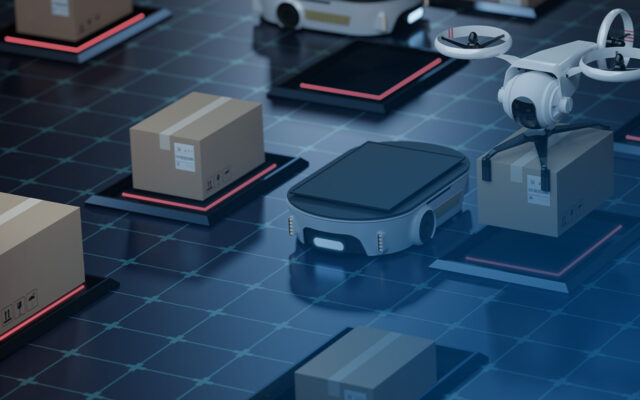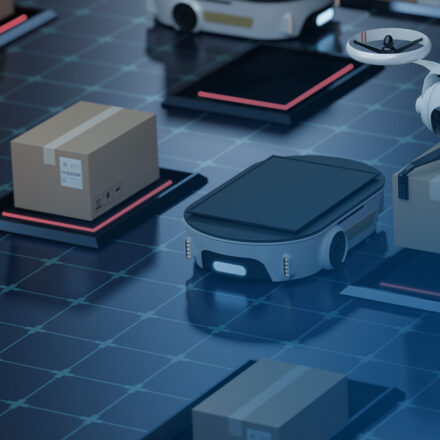Blog is co-authored by Kin-Yip Liu, Senior Director, Solutions Architecture, AMD and Kami Periman, Automotive Solutions Marketing Manager, Dell Technologies.
Picture this: self-driving cars and delivery drones navigate busy roads, while traffic-calming systems adjust in response. Passengers enjoy in-car infotainment, confident that their safety – and that of surrounding people and vehicles – is protected by a robust on-board system.
This is the ultimate autonomous vehicle (AV) vision.
However, the ability for AVs to communicate with networks, with each other and with the built environment – on a commercial, widely-deployed basis – is still very much in developmental stages. These stages, based on guidelines set by the Society of Automotive Engineers, range on a scale from zero to five. As vehicles progress higher on the scale to become more autonomous, the number of Advanced Driver Assistance Systems (ADAS) features and the integration of those systems in the vehicles increases.
Despite the different levels of maturity of these use cases, the critical infrastructure required to connect autonomous vehicles to their environment remains the same: from smaller factory environments supporting dozens of autonomous robots to the ultimate AV vision described above, every AV requires 5G infrastructure to operate more safely than a human.
However, with different consumer use cases at different stages of progression, how can communications service providers (CSP)s be confident that they’ll see a strong return on investment? How can they support the trajectory of consumer AV, whilst ensuring this journey makes good business sense?
The answer lies in supply chain 4.0. By delivering the 5G infrastructure that will eventually be needed to support smart cities and consumer AVs first in the more limited last-mile delivery, smart factory and supply chain environments, CSPs can position themselves to eventually take the front seat in the consumer AV market. Addressing and overcoming challenges in the supply chain will help CSPs to accelerate monetization in preparation for future large-scale rollout of autonomous and connected technology.
Dell Technologies and AV
At Dell, automotive solutions form the backbone of ADAS and support the entire data lifecycle. ADAS development relies on massive amounts of real-world training data, consisting of data gathered over the course of millions of miles of test driving and thousands of concurrent simulations.
Dell Technologies has partnered with AMD to build scalable infrastructure solutions sized to provide the right amount of storage, compute and GPUs (Graphics Processing Units) to support scale-out ADAS (and eventually AV) test and development workloads.
We’re working with automakers and their suppliers who are developing and testing ADAS features. By connecting them with automotive and AI partners, we’re enabling stakeholders to capture, process and manage massive amounts of data.
Our end-to-end infrastructure solutions for automotive are built on Dell PowerEdge servers featuring AMD EPYC processors. These SoC (system on a chip) devices offer higher integration of compute resources, more PCIe links and memory channels, reducing the number of processors needed and enabling faster I/O and more memory in servers – significantly advancing compute for data-intensive workloads in testing and developing ADAS features.
We’re helping to accelerate AV progression in the supply chain ecosystem, whilst at the same time creating a blueprint to accelerate the roll-out of consumer AV in the future.
5G
5G is making the supply chain 4.0 ecosystem possible, affordable and sustainable for CSPs. This next generation of network connectivity will bring significant benefits, including enabling CSPs to create the next-gen supply chain ecosystem.
Very low latency and very high availability means 5G can connect more endpoints and maintain high throughput, a key requirement of the supply chain 4.0. Workplace safety will benefit, as new solutions automate tasks like heavy lifting, and replace humans for robots when there’s a need to engage in hazardous environments.
This supply chain 4.0 vision will require buy-in from and cooperation among a broad range of stakeholders. At Dell, we’re facilitating that collaboration and integration at scale. We prove our customers with access to experts across a mix of technologies and services to bring them the full advantages of 5G.
Cost
Leveraging 5G to enable the supply chain 4.0 is far more cost-effective than with 4G. 5G capacity can be partitioned dynamically via network slicing, with multiple network slices existing on a single, shared network infrastructure, dedicated to different use cases and suiting different requirements.
The ability to rapidly program, deploy and manage this architecture will enable faster time to market for new use cases and monetization opportunities.
Better performance, greater efficiency and lower energy consumption are the key ingredients for the CSP of the future: a sustainable and environmentally responsible business, able to capitalize on the supply chain 4.0.
Dell and AMD are working together to make this happen. We’re reducing costs by enabling CSPs to scale server usage up and down while only paying for what they use. We’re reducing power in the silicon and pioneering technologies that reduce energy consumption – and cut costs.
Data Deluge
Deploying 5G will be the only way to manage, process, analyze and capitalize on the huge volumes of data that will be generated by the supply chain 4.0.
At Dell, we’re supporting and playing an active role within every stage of this data journey, providing CSPs with expertise and tools, including high-performance compute platforms, data analytics solutions, caching capability and storage.
The Future
Fully autonomous vehicles may not be hitting our roads quite yet. But we believe that by addressing vehicle autonomy in the supply chain first, CSPs will be able to more easily deliver and monetize consumer AV use cases in the near future.
Leveraging our wide portfolio of solutions with AMD, CSPs will be able to address vehicle autonomy in the supply chain, making the future rollout of AV much easier and allow for quicker ROI, at scale.
Discover how our range of solutions is transforming networks, from RAN and core to edge and cloud here.


